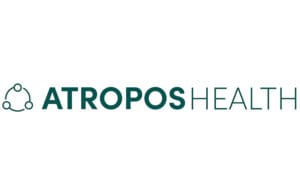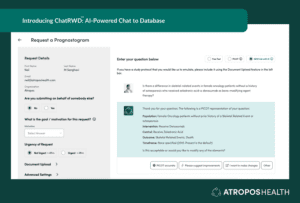 The Stanford spinout Atropos Health, which taps real-world data to analyze patient outcomes, disease trajectories, treatment effectiveness, is joining forces with Google Cloud. The company had already forged an alliance with AWS to offer its real-world evidence offerings on the AWS Marketplace and join the AWS Partner Network. The company’s core aim is to give physicians access to rapid, high-quality real-world evidence data to inform daily medical decisions.
The Stanford spinout Atropos Health, which taps real-world data to analyze patient outcomes, disease trajectories, treatment effectiveness, is joining forces with Google Cloud. The company had already forged an alliance with AWS to offer its real-world evidence offerings on the AWS Marketplace and join the AWS Partner Network. The company’s core aim is to give physicians access to rapid, high-quality real-world evidence data to inform daily medical decisions.
There are different numbers out there, but only about 20% of daily medical decisions have high-quality evidence behind them,” said Brigham Hyde, CEO of Atropos. “We call that issue the evidence gap.” While clinical-decision making is a central focus area, Atropos collaborates with life science companies. “We launched officially in pharma about six months ago,” Hyde added.
Compressing RWD generation from months to minutes

Brigham Hyde, PhD
Founded roughly in sync with the pandemic, Atropos Health was involved in the Green Button Initiative, a Stanford-originated initiative in healthcare technology designed to rapidly accelerate clinical decision-making. The idea was to give physicians the ability to ask for a data-driven second opinion based on insights extracted from healthcare data. ”The key to doing that was being able to act quickly on high-quality, reliable data drawn from millions of patient records,” Hyde said. In essence, the goal is to vastly compress the time needed to perform RWE studies or observational studies. “Typically, studies like that take months to do,” Hyde said. “That’s true in pharma too, typically.”
But many patients can’t wait months for doctors to obtain such data. And since Atropos was spun out of Stanford, the company has gotten progressively faster at delivering such actionable insights from real-world data, reducing the time from months to days, and now to minutes with applications known as ChatRWD and Geneva OS.
A chatbot with medical-grade accuracy that grows smarter over time
As chatbots like ChatGPT have gained popularity for their conversational abilities and ability to understand natural language, concerns remain about their accuracy, especially for sensitive high-stakes topics like healthcare. In spring 2023, Stanford researchers found that ChatGPT 3.5 agreed with expert answers 21% of the time while GPT-4 did 41% of the time when asking the chatbots a series of 64 real clinical questions.
Atropos is working to bridge the gap between conversational AI and evidence-based medicine by tapping real-world data to power accurate healthcare chatbots. Atropos Health’s ChatRWD, for instance, offers ChatGPT-like functionality but with medical-grade accuracy based on real-world health data. ChatRWD continuously enhances its accuracy and relevance through learning from a growing network of de-identified patient data.

The Atropos Evidence Network taps real-world data to provide the evidence needed to inform healthcare decision-making. [Credit: Atropos Health]
ChatRWD could also double as a medical misinformation fact-checker
If widely available during the early days of the pandemic, such technology could have provided rapid insights about drug repurposing against COVID-19. It could have also helped separate fact from fiction in the public discourse about COVID-19 treatments and prevention in 2020 and 2021. For instance, while both the antimalarial and autoimmune drug hydroxychloroquine and the antiparasitic drug ivermectin showed promise in vitro against COVID-19, their success in the real-world didn’t match those early laboratory results. The FDA temporarily allowed doctors to prescribe hydroxychloroquine under emergency use authorization but later revoked that decision. Despite this, public figures extolled the potential of the drugs for COVID, prompting significant public interest and self-medication attempts. Joe Rogan, for instance, host of one of the world’s most popular podcasts, promoted ivermectin for COVID. Hyde humorously said that the Atropos Health’s technology could have served as a “Joe Rogan fact checker.” Given that ivermectin is a widely used drug and SARS-CoV-2 was widely circulating, there could be evidence from patient records that sheds light on the subject. “Maybe Joe’s right, maybe he’s not. Let’s just find out.”

ChatRWD is an AI-powered platform that enables physicians to rapidly search medical data for evidence-backed decision-making. [Credit: Atropos Health]
GCP alliance expands Atropos Health’s cloud footprint
The Atropos partnership with Google Cloud is important, Hyde said, because its technology is cloud-based. “We integrate with health systems’ Google environment, sitting within their firewall.”
Atropos now has dozens of institutions across its network, managing datasets totaling more than 200 million patients. “And it’s growing each month,” Hyde said.
The scale of the data offers flexibility, making it possible for a clinician to route a question to the location in the network that likely can provide the best answer to a given question. “This process ensures no data changes hands, maintaining privacy and data security,” Hyde said. The partnership with GCP is important because many leading healthcare institutions, like the Mayo Clinic, use the platform.
Internal and external benefits
The partnership with Google Cloud offers internal and external advantages for Atropos. Vertex, a managed machine learning platform, enables enterprises to build and deploy AI models. It offers tools like Gemini, a group of multimodal large language models. “That makes building ChatRWD easier for us,” Hyde said. In addition, Atropos is also excited about working with MedPaLM and MedPaLM 2, which are Google’s large language models specialized for the medical domain. “We’re really encouraged by what we’re seeing on MedPaLM 2,” Hyde said. “It has a lot of native language knowledge about the medical area.”
The medically trained models can help with ChatRWD’s ability to convert clinical notes to medical codes. “That step is where a medically trained LLM has a real benefit,” Hyde said.
Filed Under: clinical trials, Data science, Drug Discovery, machine learning and AI



